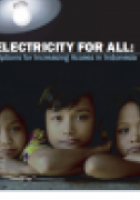Publications
Indonesia's commitment to reform is continuing to accelerate economic growth, yet a staggering one third of its people live without access to electricity. It is difficult to imagine sustaining the current 6 percent economic growth rate if such large numbers of people are left behind and cannot enjoy the fruits of this prosperity. The Indonesian Government has recognized this problem and aims to provide electricity access to 90% of the population by 2020, a worthy goal that the World Bank strongly supports. At the request of the Government, this report, Electricity for All: Options for Increasing Access in Indonesia, was developed to provide some practical solutions by which Indonesia could reach their highly ambitious, yet achievable goal.
World Bank. 2005. Electricity for All: Options for Increasing Access in Indonesia. Jakarta and Washington, DC: World Bank.
